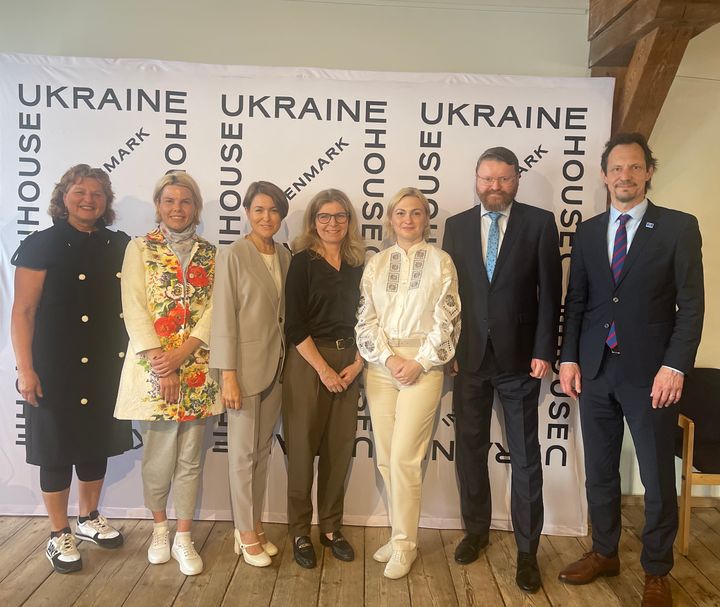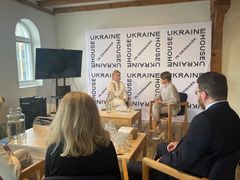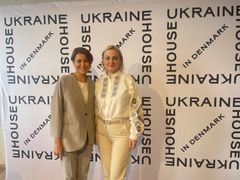"Cultural cleansing is an instrument of war; it is a tool wielded by the Russian Federation against the Ukrainian people." - Visit of Ukrainian MP Yevheniia Kravchuk, Member of the Cultural Committee of PACE, to Ukraine House in Denmark
31.5.2024 07:30:00 CEST | Ukraine House in Denmark | Pressemeddelelse

Copenhagen, Denmark - On Tuesday, May 28th, Ukraine House in Denmark hosted a compelling discussion with Yevheniia Kravchuk, Ukrainian MP, Deputy Chair of the Committee on Humanitarian and Informational Policy in the Ukrainian Parliament, and author of the PACE resolution on cultural erasure during the war. The discussion addressed the challenges and opportunities of safeguarding culture amidst the Russian aggression against Ukraine.
Key points articulated by Yevheniya Kravchuk include:
- Cultural and Physical Destruction: Russia's objective extends beyond physical annihilation of Ukrainians to encompass the obliteration of their identity. This is starkly illustrated by the destruction of language and cultural heritage, including UNESCO sites and heritage significant to specific regions, villages, or families. The collective loss felt by the community when such cultural assets are destroyed is profound.
- Threat to Ukrainian and Crimean Tatar Heritage: Since 2014 and the occupation of Crimea, Ukrainian and Crimean Tatar cultural heritage are under severe threat. Notable examples include the destruction of sites in Crimea, such as the Khan Palace, under the guise of "reconstruction."
- Digitalization of Archives: The digitalization of Ukrainian museum archives is crucial, given the targeted attacks by the Russian army and rampant looting in occupied territories. The scale of looting is unprecedented since World War II, with thousands of objects taken from the Kherson area and illegal archaeological excavations conducted by the Russian Academy of Science in Crimea, transporting Ukrainian artifacts to Russia.
- Criminal Accountability: The Office of the Secretary General has dedicated personnel addressing crimes against cultural heritage, actively working on more than eight criminal cases.
- Cultural Reparations: The cultural reparations are vital, with UNESCO estimating nearly 3.5 billion euros worth of cultural destruction in the second year of the full-scale invasion. These funds could potentially be sourced from frozen Russian assets. While cultural heritage is priceless, the examples of Warsaw and Rotterdam post-World War II illustrate the irreplaceability of many cultural treasures.
- Language and Education Under Attack: Recent attacks on Ukrainian typography, such as the bombing of the "Factor" printing house in Kharkiv, resulted in the death of seven people and the destruction of over 50,000 books, including 40% of school books for the upcoming academic year. The erasure of Ukrainian culture is further compounded by the indoctrination and russification of kidnapped Ukrainian children in Russia. The resolution proposed by Yevheniya aims to address these acts of deliberate cultural cleansing.
- Cultural Cleansing as a War Instrument: The resolution identifies cultural erasure or cultural cleansing as a weapon of war used by the Russian Federation against the Ukrainian people, potentially constituting part of a broader genocidal campaign.
- Demand for Ukrainian Culture: There is significant demand for Ukrainian art, books, and theatre within Ukraine. However, given the prioritization of defense in the state budget, additional aid is needed specifically for cultural preservation and support for artists.
- Intercultural Cooperation: To preserve Ukrainian culture, fostering intercultural cooperation is essential. Initiatives such as partnerships between libraries and museums in Denmark and Ukraine, and translation projects, are crucial.
- Targeting of Ukrainian Creatives: Ukrainian writers and creatives are being targeted, as seen in the tragic fate of the diary of Volodymyr Vakulenko, discovered and published by Viktoria Amelina, both of whom were killed by Russian forces. Many copies of the books of new contemporary authors, such as “Words and Bullets” by Nataliia Korniyenko, were destroyed in the recent attack on the "Factor" printing house.
- Imperial Legacy and "Russian World": The concept of the "Russian world" represents a neo-imperial worldview perpetuated by Russia, which continues to wage what is hoped to be the last imperial war on this continent. Unlike other colonial states, Russia has not reflected on its colonial legacy but continues to perpetuate it. True democracy in Russia necessitates acknowledging and accepting responsibility for these crimes.
Nataliya Popovych, Head of Ukraine House in Denmark, underscored that Russia's attempts to destroy Ukrainian people and culture are part of the broader genocidal character of Russia’s war against Ukraine, but unfortunately Ukraine’s allies are slow to treat this war as genocide (culturecide, ecocide) and react accordingly. At the same time for the Ukrainian culture to have a future, the Ukrainian statehood must be preserved and protected. "You simply cannot sustain culture anywhere else fully but in the home country. There is only so much you can do in diaspora," she emphasized.
The discussion highlighted the multifaceted nature of protecting cultural heritage during Russia’s war of aggression, in which cultural erasure is a key objective. Proactive measures discussed included providing Ukraine with necessary arms and permits to strike into Russian territory and using frozen Russian assets to fund the reconstruction of Ukrainian heritage and culture.
Billeder
Følg pressemeddelelser fra Ukraine House in Denmark
Skriv dig op her, og modtag pressemeddelelser på e-mail. Indtast din e-mail, klik på abonner, og følg instruktionerne i den udsendte e-mail.
Flere pressemeddelelser fra Ukraine House in Denmark
Ukraine House in Denmark Opens “Voices of Dignity: Literature of Resistance” Exhibition – A Century of Ukrainian Cultural Defiance20.2.2026 10:49:04 CET | Presseinvitation
On February 23, 2026, Ukraine House in Denmark opens its new exhibition “Voices of Dignity: Literature of Resistance” — an exploration of how Ukrainian literature has functioned not only as art, but as an act of resistance across the twentieth and twenty-first centuries. It is a tribute to the Ukrainian literary voices who were persecuted or silenced under imperial and totalitarian regimes, those who were killed as a result of Russia’s full-scale invasion, and those who continue to write under the conditions of war.
Nobelprismodtager, danske stjerner og ukrainske forfattere markerer fireåret for krigen i Ukraine med storstilet solidaritetsaften på Det Ny Teater13.2.2026 12:43:20 CET | Presseinvitation
Den 22. februar 2026 inviterer Ukraine House in Denmark, Dansk Kulturinstitut og Det Ny Teater til ”Ukrainske Stemmer – historier om frihed”, en solidaritetsaften for Ukraine på tærsklen til fireåret for Ruslands fuldskalainvasion. På scenen kan bl.a. opleves den ukrainske nobelprismodtager Oleksandra Matviichuk, den danske verdensstjerne Nikolaj Coster-Waldau, Bodil Jørgensen, Ellen Hillingsø, Christine Albeck Børge, et 26 personers stort kammerorkester, samt en række ukrainske kunstnere.
Nobel Prize winner, Danish stars and Ukrainian writers mark the fourth anniversary of the war in Ukraine with a solidarity evening at Det Ny Teater30.1.2026 12:48:22 CET | Presseinvitation
On February 22, 2026, Ukraine House in Denmark, the Danish Cultural Institute and Det Ny Teater invite you to “Ukrainian Voices – Stories of Freedom”, a solidarity evening for Ukraine on the eve of the fourth anniversary of Russia’s full-scale invasion. On stage, you can experience, among others, the Ukrainian Nobel Prize winner Oleksandra Matviichuk, the Danish world star Nikolaj Coster-Waldau, Bodil Jørgensen, Ellen Hillingsø, Christine Albeck Børge and a number of Ukrainian artists.
Udstillingen »My Body Is a Battlefield« udsat for hærværk i København23.12.2025 12:39:22 CET | Nyhed
København, 23. december 2025 – Ukraine House in Denmark (UHD) og Spilne Art fordømmer på det kraftigste hærværket mod skulpturerne fra udstillingen »My Body Is a Battlefield. Copenhagen« [Min krop er en slagmark, København] af den ukrainske kunstner Mariia Kulykivska. Udstillingen, der var organiseret af Spilne Art i samarbejde med Ukraine House i Danmark, blev udsat for hærværk i fuldt dagslys den 22. december 2025 i nærheden af UHD's lokaler.
Exhibition “My Body Is a Battlefield.” vandalised in Copenhagen23.12.2025 11:27:49 CET | Nyhed
Copenhagen, 23 December 2025 — Ukraine House in Denmark (UHD) and Spilne Art strongly condemn the vandalism of outdoor sculptures from the exhibition “My Body Is a Battlefield. Copenhagen” by Ukrainian artist Mariia Kulykivska. The exhibition, organised by Spilne Art in cooperation with Ukraine House in Denmark, was vandalised in broad daylight on 22 December 2025 near the premises of UHD.
I vores nyhedsrum kan du læse alle vores pressemeddelelser, tilgå materiale i form af billeder og dokumenter samt finde vores kontaktoplysninger.
Besøg vores nyhedsrum

